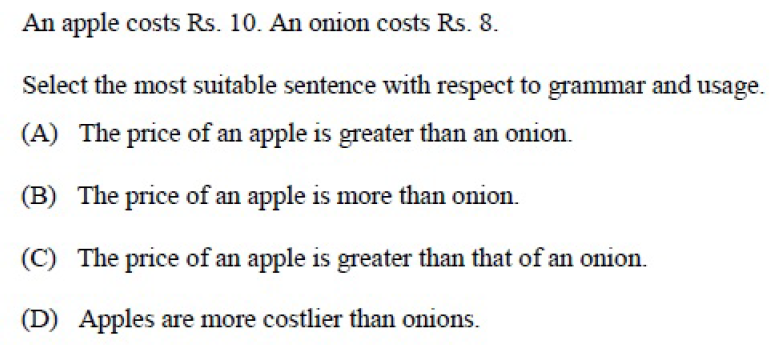I think C is correct option.
D option is clearly wrong since more and costlier can't come together.
I don't understand why other options are wrong?
Please suggest.

-
2By the way, for future questions it may be better for you to ask on our sister site: English Language Learners. There are a lot of helpful people there.– herissonCommented Feb 6, 2016 at 8:46
1 Answer
Sentence A is grammatically correct, but logically problematic. This is because A compares two unalike things: the price of the apple, and the onion itself. A price cannot be greater than an onion. It would be correct to say "The price of an apple is greater than the price of an onion." (As you've noted, sentence C is correct, and is basically an abbreviation of the preceding sentence with "that of" used instead of "the price of" to avoid repetition.) You would use "greater than an onion" in a sentence like "An apple is greater than an onion," although this sentence is still not very good since the word "greater" isn't precise in this context. It's actually not uncommon for native speakers to produce sentences like A, and some of them might have trouble noticing what's wrong with it, but it is formally considered incorrect for the reasons I gave above.
You should be able to tell B is wrong because "onion" is in singular form, but has no article before it. While "onion" can probably be used as a mass noun in some cases (such as "Don't put too much onion in the salad"*), it doesn't make sense to compare a single apple to an unspecified mass of onion (or to compare their respective prices).
*taken from "The Formal Representation of (Quasi-) Continuous Concepts," by Harry Bunt, in Formal Theories of the Commonsense World, by Jerry R. Hobbs, Robert C. Moore
-
1And D is definitely wrong. Though ...more costly than an onion would be fine.– WS2Commented Feb 6, 2016 at 10:28
-
It's not incorrect. It has implicit words. The price of an apple is greater than [the price of] an onion. Occurs in common speech all the time.– JoshuaCommented Jan 13, 2022 at 1:00
